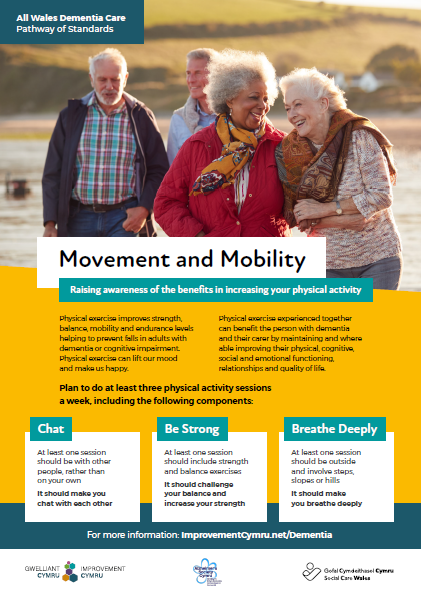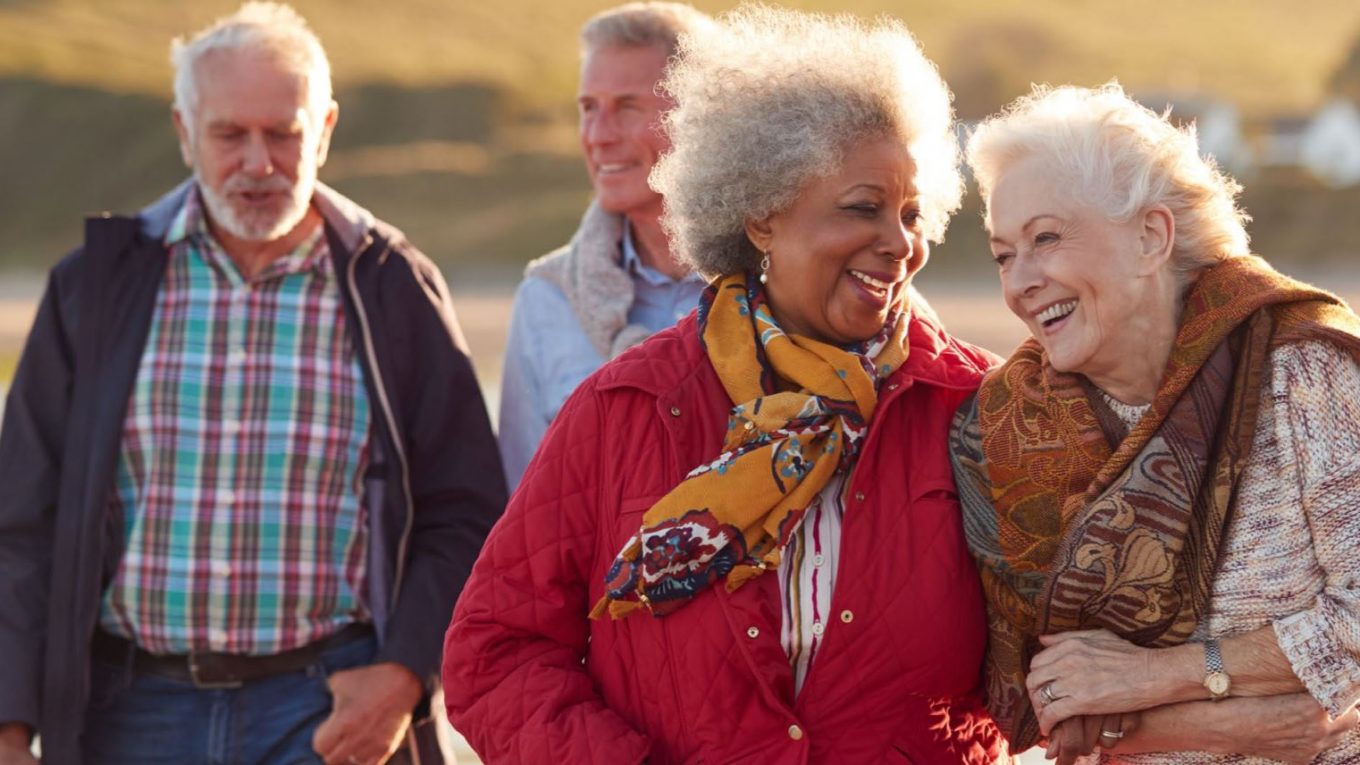Movement and Mobility, raising awareness of the benefits in increasing your physical activity, by Andrew Clyne, Clinical Falls Practitioner, Hywel Dda University Health Board
The All Wales Dementia Care Pathway of Standards promotes Movement and Mobility as part of Standard 9. The work to produce this standard has been led by Improvement Cymru and partners to promote physical health and mental well-being, after a diagnosis of dementia or mild cognitive impairment.
We know that physical exercise improves strength, balance, mobility and endurance levels, helping to prevent falls in adults with dementia or cognitive impairment. Physical exercise can lift our mood and make us happy.
Evidence also suggests that physical exercise experienced together can also have benefits for the person with dementia and their carer by maintaining and, where able, improving their physical, cognitive, social and emotional functioning, relationships and quality of life.

We are promoting awareness of the benefits if people plan to do at least three physical activity sessions a week.
Chat
At least one session should be with other people, rather than on your own. It should make you chat with each other.
Be Strong
At least one session should include strength and balance exercises. It should challenge your balance and increase your strength.
Breathe Deeply
At least one session should be outside and involve steps, slopes or hills. It should make you breathe deeply.
In the 18 months of engagement, discussions and powerful feedback to shape the standards, people told us that that there is a lack of information about the importance of Movement and Mobility.
We are looking at the training and support needed by exercise groups, local sessions and clubs so they are more confident to support their members or new members who are exercising with dementia.
Improvement Cymru heard from people who reported that they only had access to expertise in movement and mobility after problems arose.
It’s important that people living with dementia, their families and staff at Memory Assessment Services need easy access to physiotherapists if any changes occur in mobility following a diagnosis of dementia.
Stories from the engagement workshops:
Kenn lived by himself in a large village. He had fallen over on more than one occasion but was unable to attend the Strength and Balance Group. He was seen by a Physiotherapist and provided with a bespoke Exercise Programme. This was kept in a yellow folder in the kitchen and his son would phone, three days a week, to remind Kenn to do the programme.
Gareth was a fit man in his 50s when he was given a diagnosis of early onset dementia. At the time of diagnosis, he enjoyed walking and running locally. He then struggled to run safely so he used some of his personal budget to pay for a Carer to go for a walk with him each week. He joined the Local Health Walks, from the local Leisure Centre, or else just walked with his Carer. It was not easy to find a Carer who was fit enough to walk at a good pace for 3 to 5 miles and provide support for Gareth, but Gareth was able to carry on with these walks after a suitable Carer was found.
Dorothy was a keen walker. After being given a diagnosis of dementia she joined a Nordic Walking group with her daughter. Dorothy would talk to group members during the group and afterwards over a cup of tea. Over the years Dorothy became increasingly scared of dogs, as a result other group members would always ensure they moved around to ‘shield’ Dorothy from any approaching dogs.
Alison a retired health professional in her eighties, exercising with dementia, was a regular member of the seated exercise session at the local Leisure Centre, for many years. Over time she became less able to talk but always enjoyed the session. One day another group member became breathless and had a panic attack. Alison walked over sat alongside and held hands until the person regained control of their breathing. Her personality and professional background made her a valued member of the exercise group.
A poster with further information about Movement and Mobility can be found here
The All Wales Dementia Care Pathway of Standards (High Level Standard Descriptors) can be found here
Andrew Clyne is a physiotherapist and works in Pembrokeshire as a Clinical Falls Specialist for Hywel Dda University Health Board.

